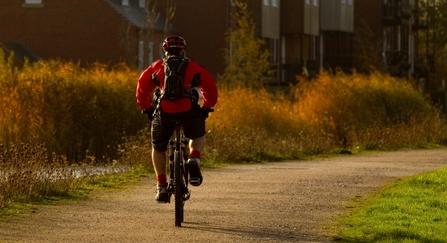
Image by: Ben Hall/2020VISION

Image by: Ben Hall/2020VISION
Today the Government announces the publication of a White Paper, Planning for the Future.
The Wildlife Trusts believe there are fundamental flaws in the current planning system because it has allowed huge declines in the natural world - and the proposed reform of the process will make a bad situation much worse.
Mike Pratt, Northumberland Wildlife Trust’s Chief Executive says: "We live in one of the most nature-depleted countries in the world. The White Paper proposes a planning system with three categories of land - earmarked for growth, renewal and protection - but this simplification brings the risk of creating a disconnected landscape, one in which wildlife continues to decline because nature doesn’t slot into neat little boxes.
“Protecting isolated fragments of land is not enough to help wildlife recover, nor will it put nature into people’s lives - something that has been recognised as vital for our health and wellbeing since lockdown in March.”
The 46 UK Wildlife Trusts care for 250,000 acres across 2,300 nature reserves and advise on how a further half a million acres are managed. We improve vast areas for nature – as well as protecting thousands of acres through influencing planning decisions each year.
In this region, Northumberland Wildlife Trust manages over 60 nature reserves with a range of habitats - upland, lowland, urban and coastal, across Newcastle, Northumberland and North Tyneside.
Nikki Williams, Director of Campaigning and Policy at The Wildlife Trusts says: “It’s critical that government weaves nature into the heart of every housing development, old and new. Government proposals for ‘tree-lined streets’ are nothing like enough. Parks, green spaces and all the areas around our homes must be part of a wild network of nature-rich areas that will benefit bees and birds as much as they will enable people to connect with on-your-doorstep nature every single day. This is essential if we are to tackle the twin climate and biodiversity crises as well as provide homes that people want to live in surrounded by beautiful, buzzing green spaces.
“The Government may find it inconvenient that wildlife won’t stick to its three categories and survives outside protected areas, as well as thriving on some brownfield sites that it would like to see developed. So, the new growth and renewal areas must benefit wildlife too."
The Wildlife Trusts believe the ability of local people to have their say must not be reduced - instead, it is important that the voice of local communities is heard louder than ever so that affordable housing can be surrounded by wild spaces, clean air and healthier surroundings to realise the government ambition for 'higher regard on quality and design than ever before.
All the Wildlife Trusts work with national and local government, businesses and local communities to influence planning and development to achieve better outcomes for wildlife. They respond to around 6,500 planning applications per year, and tens of thousands more are vetted and checked for impacts on wildlife.
Mike Pratt concludes: “Research shows that time spent in nature is good for you and there are many studies that show the links between access to nature and better health. It also shows that urban living with little or no contact with nature can increase physical and mental health problems. Nature too is suffering; urban development is a significant factor in the continuing loss of wildlife and wild spaces.”